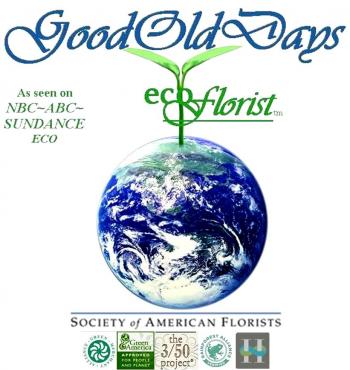What is an easier way to tell your mother you love them than with fresh flower bouquets?
Fresh cut flowers are used to mark important occasions, both celebratory and mourning alike. It is an easy gift that does not require much planning, as arranged bouquets are ubiquitous in supermarkets around springtime holidays. That also makes it a big business—a $7 billion dollar one in the US alone. Americans were expected to spend $2.56 billion on flowers for Mother’s Day in 2020.
However, those fragrant flower bouquets stink of environmental pollution.
Find Eco-Friendly Gifts for Mom
Fresh Cut Flowers Contribute to the Climate Crisis
80 percent of flowers sold in the US are imported from other countries.
93 percent are grown in Colombia or Ecuador, the second- and third-largest exporters of cut flowers in the world, respectively. The warm climates of these Latin American countries during the winter months of the US, as well as their cheaper labor, contribute to their dominance in the global flower trade.
California, the leading producer of domestic roses, cannot keep up with the sheer volume of flowers expected to be purchased by shoppers during Valentine’s Day. Therefore, transporting fresh cut flowers internationally result in excess carbon emissions that contribute to the climate crisis.
Additionally, fresh cut flowers must be refrigerated to prevent wilting. Often, fresh cut flowers are stored in a refrigerated warehouse before being transported in a cargo plane, then are sent to another refrigerated warehouse where they wait to be purchased.
Most refrigerated containment systems emit hydrofluorocarbons, or HFCs, which are greenhouse gases estimated to be 9000 times more potent than CO2 at warming the atmosphere.
Walmart, which sells bouquets for less than $10, emits over 2.8 million metric tons of HFCs every year—the energy equivalent of powering all the households in San Francisco.
Fresh Cut Flowers Contribute to Toxic Pollutants
Fresh cut flowers are also treated with synthetic pesticides, which persists on the bouquets that make it to supermarkets and some commercial florist shops.
Synthetic herbicides and pesticides like glyphosate are known carcinogens that can pollute waterways and seep into drinking water supplies.
Plus, it's a health risk for workers handling the chemicals.
Additionally, insecticides kill both harmful and beneficial bugs alike, contributing to the alarming decline of key pollinator species.
While there are rules that dictate the use of synthetic pesticides on edible crops, the flower trade can skirt these regulations because they are not classified as food. Methyl bromide—a highly effective gas fumigant—has been used in floriculture to eliminate pests like rodents, insects, and fungi.
The pesticide is also highly toxic and long-term exposure can result in neurological effects in humans and animals, according to the EPA.
What’s the Alternative?
Surprising your loved ones with fresh cut flowers doesn’t have to have a negative impact on the environment or human health.
Certified and "Slow Flowers"
The “slow flower movement” is a push for synthetic pesticide-free, local, and seasonal bouquets. Florists that operate under these principles grow and cultivate native plants and is a great alternative to the harmful effects of the floriculture industry.
Seek out certified green businesses, like Good Old Days Florist, which conduct business practices that do the least harm to the environment.
Grow Your Own Flowers
Homegrown flowers might not be as hard as you think and circumvent the carbon emissions associated with imported flowers simply because they don’t need to be transported.
Additionally, homegrown flowers can mean that much more since it took time and care to cultivate. If you grow flowers in your yard or on a windowsill, you will also be supporting beneficial pollinators like bees and butterflies.
Gifts Other than Flowers
Trees for a Change offers the opportunity to dedicate a loved one the gift of a tree. The green business plants trees in US National Forests damaged by wildfires and is the only tree gifting company that allows you to track the location of the tree so you may visit it. Unlike cut flowers, trees can live on for decades and help restore crucial habitats.
Yet the most environmentally-friendly gifts are those that are handmade from repurposed items or regifted. While these may take a little more time and some foresight, the thoughtfulness and message can go a long way in showing how much you care.





